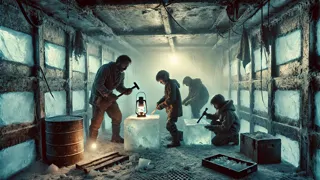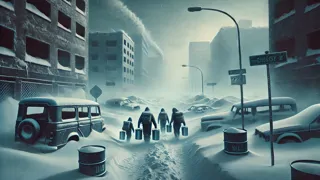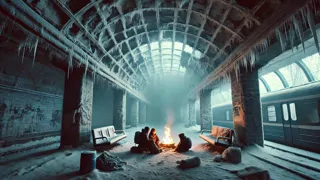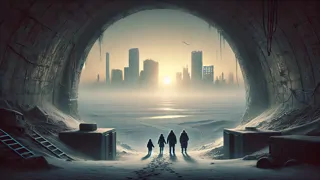Introduction
In the frozen aftermath of an unimaginable catastrophe, Earth has turned into an endless cathedral of ice and silence. No wind stirs the empty streets, and every gulp of air must be earned by chipping away at glaciated slabs that latch to the sky like crystalline prison bars. Within one battered shelter, a small family—father, mother, and two young children—huddles around a conjured hearth, its flickering flame coaxed from the last drops of liquid propane scavenged months ago. Outside, the temperature plunges further, testing the walls of their metal refuge, inching even the thickest insulation toward brittle failure. Their breaths hang heavy in the dim interior, visible in clouded wisps that remind them of the life they once took for granted. Each dawn is no longer a promise of warmth but a gamble: Can they mine enough frozen atmosphere today to carry them through the endless twilight? With every block of ice they harvest, they feed the tiny furnace that stands between them and the abyss. Memories of laughter under open skies are fading into legends, catalogued only within fading photographs. Yet hope, like a stubborn ember, refuses to die. Even as the wind outside howls like the lost voices of the dead, they cling to one another, forging fragile plans for rescue, for repair, for escape. In a world without air, every breath is a battleground—and they intend to win.
Chiseling Hope from Ice
By the broken window frame, where outside light once streamed warm and golden, now only a pale blue gloom filtered through frostcrusted glass. The father, Garrett, hefted his ice pick with aching arms, each swing releasing a cascade of glimmering shards. Behind him, his daughter, Lila, kneeled on a ragged tarp, stacking blocks of solid air—dense, glasslike cubes that would slowly thaw within their furnace, providing the breath they could no longer take for granted. Their mother, Mara, kept the flame alive, feeding the tiny stove with bits of wood and scraps of fabric sealed in oil-soaked rags. The children whispered prayers to a sky they had never seen, birthing dreams of distant rescue.

Beyond the brittle cabin walls, the world lay abandoned. Street signs jutted from drifts higher than two-storey houses, and skeletal husks of vehicles lay half-buried beneath snow that never melted. Wind gusted through narrow alleys, carving glassy ridges across every surface, its mournful howl echoing like a warning that time itself had frozen. Yet behind the constant shudder of metal joints and the quake of their homemade furnace, the family found rhythm in routine: mine, stack, thaw, breathe. They measured survival in pails of thawed air and grateful murmurs at each exhalation.
At dusk—if dusk could even be called dusk in a world locked in twilight—Garrett would seal the last cube for the night, and Mara would lay her hands over the flame, whispering lullabies older than themselves. They had salvaged what remained from a collapsed civilization: a battered radio, two propane tanks with dwindling reserves, and a handful of canned rations. Beyond provisions, they carried intangible supplies: stubborn courage, dogged hope, and a promise to their children never to surrender.
Their greatest challenge began when a thunderous crack split the silence. Ice shifted beneath the shelter, and small fissures snaked through the roof. Water from melted snow dripped into their haven, freezing instantly on the hearth. Mara’s calm voice cracked: "We must move." For the first time since the sky froze, they abandoned their hearth, carrying the precious blocks in steel pails into the endless white, determined to find a safer refuge that might hold air for just a little longer.
Silence of the Abandoned City
Their journey led them through what once had been a bustling city center. Asphalt roads lay buried beneath vaults of snow, and street lamps hung at impossible angles, their wires snapped. The siblings, Lila and her younger brother, Jax, walked hand in hand, their breaths visible clouds between them, each exhale a reminder of mortality. They passed storefronts whose glass windows had fractured in the freeze, interiors crystallized in eucalyptus-green frost.

In the hollowed hulk of a library, Ernest—an elderly neighbor they met along the way—showed them walls covered with ancient maps and calendars, artifacts of a warmer age. They rifled through brittle pages, seeking any clue about survivors or salvageable supplies. For hours, they pored over grainy images of oceans and forests, landscapes that now existed only in memory.
As twilight bled into darkness, the temperature plunged further. Mara lit a small Coleman lamp, its yellow glow dancing on frost-laden books. "We can’t stay," she murmured, "or that lamp will be our last warmth." They gathered what they could carry: a half-full jerry can, a cracked compass, and two pails of newly harvested ice.
At dawn’s false promise, they emerged into an open square where a collapsed subway entrance yawned like a frozen maw. Garrett tested the ice crust with his pick; beneath, a cavern of relative silence promised shelter. But as they descended, the air grew thin. Every inhalation required a small ration of thawed ice. Waiting in the pitch-dark corridor, they braced themselves—silver breath drifting in the stale gloom—as the furnace flickered behind them.
Embers in Endless Night
Deep beneath the city, they found an old ventilation shaft—an airtight chamber once used to regulate airflow to subway cars. Mara sealed the grate while Garrett coaxed their small stove to life. Sparks crackled against the metal walls, illuminating the children’s hopeful faces. For a moment, they tasted victory: in this underground hollow, the air might hold just long enough for rescue.

But the shaft’s seal was imperfect. Thin ribbons of wind seeped through rusty hinges, carrying icicles that formed across the grate. Each drip echoed through the chamber like a countdown. The family sat in a tight circle around the stove. Lila offered Jax a piece of wool cloth, and he wrapped it around his face, breathing through it to conserve warmth. Mara patted his shoulder. "Every ember matters," she said softly, smoothing his frost-flecked hair.
Outside, the storm that never ended raged higher, gusts rattling the above grate as if pleading to break in. Garrett tightened bolts, applying a mixture of wax and oil to slow the freeze. His fingers stung with cold, blood trickling from small cracks in his knuckles. Yet he labored on, driven by the promise of tomorrow.
When supplies ran perilously low, a distant rumble gave new purpose to their ordeal. They loaded the last two blocks of ice into the stove’s firepot. A lone, defiant spark flared. It cast dancing shadows on their weary faces, shining brighter than any starless sky above. In that fierce glow, they recognized their own reflection: a testament to human will refusing to fade, even when the world itself had turned to glass.
Conclusion
As the ember sputtered and the grate above groaned under the storm’s weight, the family drew closer. Each heartbeat echoed in the icy silence, mirroring the fragile rhythm of their flickering flame. In that narrow chamber, they understood what it meant to persevere: not to conquer the cold with grand gestures, but to honor each breath, each spark, each shared moment as sacred. Outside, the world remained a crystalline tomb, but within the cage of steel and frost, hope endured. Their journey had become more than a fight for air—it was a testament to the human spirit’s refusal to yield. And in that final, amber glow, they saw a promise: no matter how deep the freeze, a single ember of courage can ignite an entire universe of possibility.


















